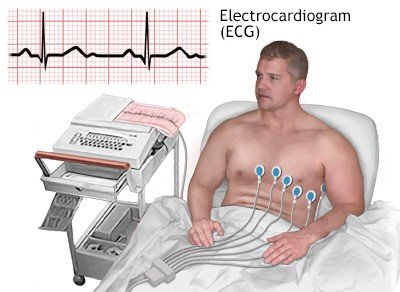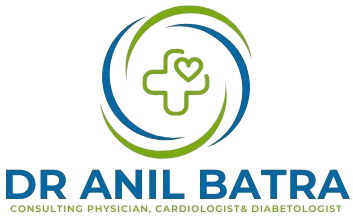What is an ECG: Insights from Dr. Anil Batra on Heart Health
An electrocardiogram (ECG) checks your heart’s function by measuring the electrical signals it produces with each beat. This simple and painless procedure involves placing small sticky pads, called electrodes, on your chest, arms, and legs. These electrodes detect the heart’s electrical activity, which gets transmitted to a machine that creates a picture of your heart’s rhythm.
Dr. Anil Batra, a consulting physician in Bhopal, uses ECGs to evaluate cardiovascular health. This test diagnoses various heart conditions like arrhythmias, heart attacks, and other heart diseases. It also helps monitor the effectiveness of treatments and medications.
How Does it Work?
- Electrodes: During the procedure, medical professionals place small sticky patches, known as electrodes, on your arms, legs, and chest. They then connect these electrodes to wires that transmit signals to a machine.
- Recording: The machine records the electrical signals that generate your heartbeat. It then prints these signals on paper or displays them on a screen as a series of waves.
- Interpreting the Results: Dr. Anil Batra examines the waves on the ECG to dr working too hard.
This serves as a simple yet powerful tool for doctors like Dr. Anil Batra to assess heart function. This painless test provides valuable information that contributes to heart health.

Signs you need to know
Chest Pain or Discomfort
If you experience chest pain, pressure, tightness, or discomfort—especially if it radiates to your arm, neck, or jaw—it may indicate a heart problem that requires an ECG for further evaluation.
Shortness of Breath
Difficulty breathing or feeling unable to catch your breath, even during normal activities, may signal heart or lung issues that necessitate an ECG for proper assessment.
Irregular Heartbeat
If you notice your heart beating too fast, too slow, or irregularly (palpitations), an ECG can help Dr. Anil Batra, a consulting physician in Bhopal, identify the underlying cause.
Dizziness or Fainting Spells
Feeling dizzy, lightheaded, or fainting without a clear reason may indicate an abnormal heart rhythm or other heart issues that an ECG can detect.
Family History of Heart Disease
Your close relatives, such as parents or siblings, have experienced heart disease at a young age, you may require regular ECGs to monitor for any inherited heart conditions.
High Blood Pressure or Cholesterol
Having high blood pressure or elevated cholesterol levels increases your risk of heart disease. In these cases, regular ECGs can help monitor your heart's health.
Diabetes
People with diabetes are at higher risk of heart problems. An ECG may be recommended as part of regular checkups to detect any issues early.
Prior Heart Conditions
A heart attack, heart surgery, or other heart problems in the past, regular. ECGs help monitor your heart's recovery and ongoing health.
Physical Exam Findings
During a routine physical exam, if Dr. Anil Batra hears abnormal heart sounds or detects other signs of heart issues, he may recommend an ECG for further investigation.
Age and Lifestyle Factors
As you age, or if you engage in unhealthy habits such as smoking, maintaining a sedentary lifestyle, or consuming excessive alcohol, regular ECGs can help monitor your heart's health.
Recognizing these signs and discussing any concerns with Dr. Anil Batra ensures timely detection and management of potential heart issues through an ECG. Regular checkups are essential for maintaining overall health and well-being.
Types of ECG
Understanding the different types of ECG helps consulting physicians in Bhopal, like Dr. Anil Batra, diagnose various heart conditions and monitor heart health effectively.
